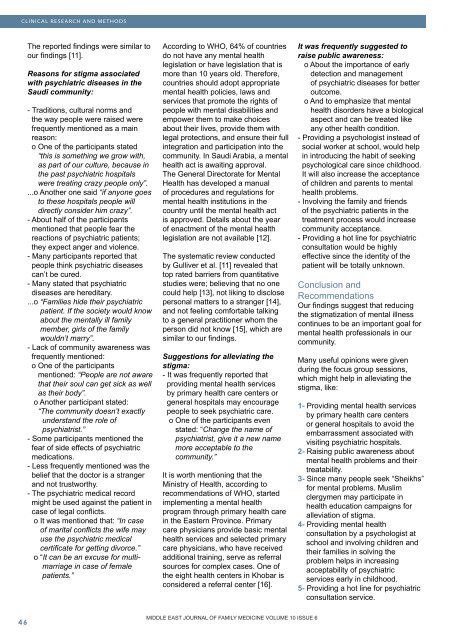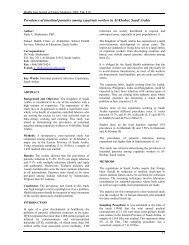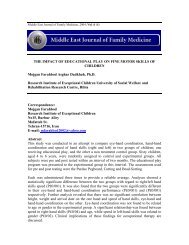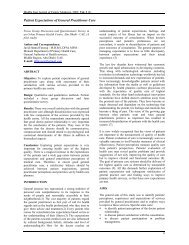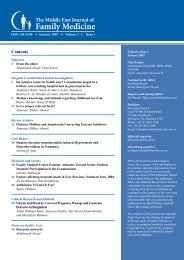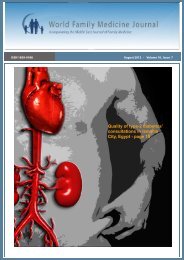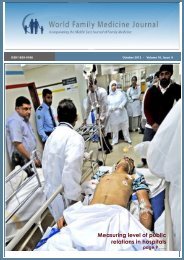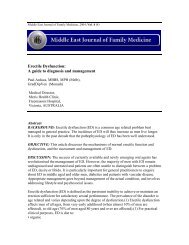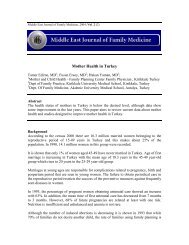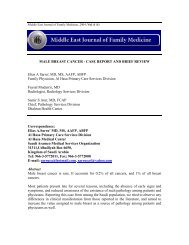full pdf of issue - Middle East Journal of Family Medicine
full pdf of issue - Middle East Journal of Family Medicine
full pdf of issue - Middle East Journal of Family Medicine
Create successful ePaper yourself
Turn your PDF publications into a flip-book with our unique Google optimized e-Paper software.
CLINICAL RESEARCH AND METHODS<br />
The reported findings were similar to<br />
our findings [11].<br />
Reasons for stigma associated<br />
with psychiatric diseases in the<br />
Saudi community:<br />
- Traditions, cultural norms and<br />
the way people were raised were<br />
frequently mentioned as a main<br />
reason:<br />
o One <strong>of</strong> the participants stated<br />
“this is something we grow with,<br />
as part <strong>of</strong> our culture, because in<br />
the past psychiatric hospitals<br />
were treating crazy people only”.<br />
...o Another one said “if anyone goes<br />
to these hospitals people will<br />
directly consider him crazy”.<br />
- About half <strong>of</strong> the participants<br />
mentioned that people fear the<br />
reactions <strong>of</strong> psychiatric patients;<br />
they expect anger and violence.<br />
- Many participants reported that<br />
people think psychiatric diseases<br />
can’t be cured.<br />
- Many stated that psychiatric<br />
diseases are hereditary.<br />
...o “Families hide their psychiatric<br />
patient. If the society would know<br />
about the mentally ill family<br />
member, girls <strong>of</strong> the family<br />
wouldn’t marry”.<br />
- Lack <strong>of</strong> community awareness was<br />
frequently mentioned:<br />
o One <strong>of</strong> the participants<br />
mentioned: “People are not aware<br />
that their soul can get sick as well<br />
as their body”.<br />
o Another participant stated:<br />
“The community doesn’t exactly<br />
understand the role <strong>of</strong><br />
psychiatrist.”<br />
- Some participants mentioned the<br />
fear <strong>of</strong> side effects <strong>of</strong> psychiatric<br />
medications.<br />
- Less frequently mentioned was the<br />
belief that the doctor is a stranger<br />
and not trustworthy.<br />
- The psychiatric medical record<br />
might be used against the patient in<br />
case <strong>of</strong> legal conflicts.<br />
o It was mentioned that: “In case<br />
<strong>of</strong> marital conflicts the wife may<br />
use the psychiatric medical<br />
certificate for getting divorce.”<br />
o “It can be an excuse for multimarriage<br />
in case <strong>of</strong> female<br />
patients.”<br />
According to WHO, 64% <strong>of</strong> countries<br />
do not have any mental health<br />
legislation or have legislation that is<br />
more than 10 years old. Therefore,<br />
countries should adopt appropriate<br />
mental health policies, laws and<br />
services that promote the rights <strong>of</strong><br />
people with mental disabilities and<br />
empower them to make choices<br />
about their lives, provide them with<br />
legal protections, and ensure their <strong>full</strong><br />
integration and participation into the<br />
community. In Saudi Arabia, a mental<br />
health act is awaiting approval.<br />
The General Directorate for Mental<br />
Health has developed a manual<br />
<strong>of</strong> procedures and regulations for<br />
mental health institutions in the<br />
country until the mental health act<br />
is approved. Details about the year<br />
<strong>of</strong> enactment <strong>of</strong> the mental health<br />
legislation are not available [12].<br />
The systematic review conducted<br />
by Gulliver et al. [11] revealed that<br />
top rated barriers from quantitative<br />
studies were; believing that no one<br />
could help [13], not liking to disclose<br />
personal matters to a stranger [14],<br />
and not feeling comfortable talking<br />
to a general practitioner whom the<br />
person did not know [15], which are<br />
similar to our findings.<br />
Suggestions for alleviating the<br />
stigma:<br />
- It was frequently reported that<br />
providing mental health services<br />
by primary health care centers or<br />
general hospitals may encourage<br />
people to seek psychiatric care.<br />
o One <strong>of</strong> the participants even<br />
stated: “Change the name <strong>of</strong><br />
psychiatrist, give it a new name<br />
more acceptable to the<br />
community.”<br />
It is worth mentioning that the<br />
Ministry <strong>of</strong> Health, according to<br />
recommendations <strong>of</strong> WHO, started<br />
implementing a mental health<br />
program through primary health care<br />
in the <strong>East</strong>ern Province. Primary<br />
care physicians provide basic mental<br />
health services and selected primary<br />
care physicians, who have received<br />
additional training, serve as referral<br />
sources for complex cases. One <strong>of</strong><br />
the eight health centers in Khobar is<br />
considered a referral center [16].<br />
It was frequently suggested to<br />
raise public awareness:<br />
o About the importance <strong>of</strong> early<br />
detection and management<br />
<strong>of</strong> psychiatric diseases for better<br />
outcome.<br />
o And to emphasize that mental<br />
health disorders have a biological<br />
aspect and can be treated like<br />
any other health condition.<br />
- Providing a psychologist instead <strong>of</strong><br />
social worker at school, would help<br />
in introducing the habit <strong>of</strong> seeking<br />
psychological care since childhood.<br />
It will also increase the acceptance<br />
<strong>of</strong> children and parents to mental<br />
health problems.<br />
- Involving the family and friends<br />
<strong>of</strong> the psychiatric patients in the<br />
treatment process would increase<br />
community acceptance.<br />
- Providing a hot line for psychiatric<br />
consultation would be highly<br />
effective since the identity <strong>of</strong> the<br />
patient will be totally unknown.<br />
Conclusion and<br />
Recommendations<br />
Our findings suggest that reducing<br />
the stigmatization <strong>of</strong> mental illness<br />
continues to be an important goal for<br />
mental health pr<strong>of</strong>essionals in our<br />
community.<br />
Many useful opinions were given<br />
during the focus group sessions,<br />
which might help in alleviating the<br />
stigma, like:<br />
1- Providing mental health services<br />
by primary health care centers<br />
or general hospitals to avoid the<br />
embarrassment associated with<br />
visiting psychiatric hospitals.<br />
2- Raising public awareness about<br />
mental health problems and their<br />
treatability.<br />
3- Since many people seek “Sheikhs”<br />
for mental problems. Muslim<br />
clergymen may participate in<br />
health education campaigns for<br />
alleviation <strong>of</strong> stigma.<br />
4- Providing mental health<br />
consultation by a psychologist at<br />
school and involving children and<br />
their families in solving the<br />
problem helps in increasing<br />
acceptability <strong>of</strong> psychiatric<br />
services early in childhood.<br />
5- Providing a hot line for psychiatric<br />
consultation service.<br />
46 MIDDLE EAST JOURNAL OF FAMILY MEDICINE VOLUME 10 ISSUE 6<br />
MIDDLE EAST JOURNAL OF FAMILY MEDICINE • VOLUME 7, ISSUE 10


